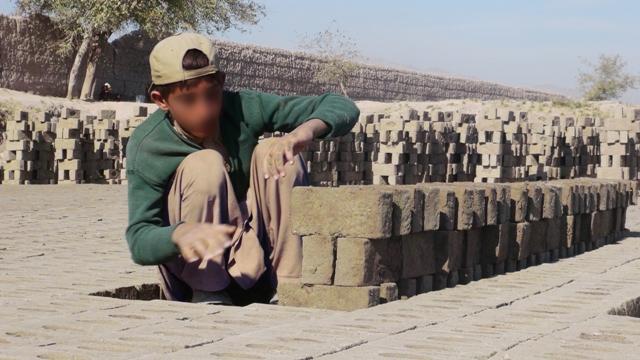JALALABAD (Pajhwok): A minor boy from eastern Nangarhar province, deprived of his right to education, has to work hard nine hours a day in a brick kiln to repay family debts.
Wahid, 13, has to wake up at 6:00am. Instead of going to school, walks straight to pits to wet mud for bricks in the chilly weather.
Wahid is not the only child labourer. The Department of Work and Social Affairs says around 3,000 teens are working in different bricks kilns across the province, dropping out of school.
In the Ahmadzai village of Surkhrod district, there is a huge ground where elders, young men and children could be seen kneading mud close to a brick factory.
Gul Ahmad, his wife and five children are among the bonded labourers; they have borrowed 60,000 afghanis from the kiln owner.
Four years back, on his return from Peshawar, Ahmad borrowed 60,000 afghanis from the factory owner to pay other debts. The family has since been working to return that amount..jpg)
He has been unable to pay back the debt. “We are given 600 rupees per 1,000 bricks. My two sons and I lay 2,500-3,000 bricks daily. This amount we spend on meeting family needs and the loan remains unpaid.”
Ahmad’s son Wahid is also busy working laying bricks along with his father. With skinny hands, the boy prepares clay for bricks and later helps his father lay bricks all day long.
Like other Afghans, they take meals thrice a day. The difference is that Gul’s family eats bread with green tea in the morning, potatoes or other vegetable in lunch and the same food in dinner.
After the Eid-ul-Adha, Wahid has eaten meat only once in a wedding ceremony. After that he has not even see it. The teen says he is extremely pained to see other boys of his age going to school as he works in the brick kiln.
“I see my dreams shattered, unable to go to school because of poverty. I want to study and become a doctor or an engineer,” he comments,
He works more than nine hours a day. They boy says he stops working in the evening, too tired to play or study.
They will have to be content with hard labour till they repay the kiln owner’s debt or save enough money so that his father could find start some other business.
Frustration writ large on his face, Wahid’s father says: “I had no option but to borrow 60,000 afghanis from the owner and now we have to work for him.” (Ahmad and Wahid are not real names).
On the other hand, the kiln owner vehemently denies forcing the family into bonded labour. Instead they claim providing them with shelter and work opportunities.
Haji Malyar, in charge of the Malyar Bricks Factory, says he lent 60,000 rupees to the family to resolve their financial problems. He will never ask them to work once he got back his money.
Director of Works and Social Affairs Abdul Hakim Sherzad acknowledged dozens of families were working as bonded labourers in brick kilns in Surkhroad district. Their children are involved in hard labour and deprived of education.
His department arranges discussions every month on how to rescue the children involved in hard labour and provide them with education.
Bricks factory owners, the director admits, exploited such workers by giving them small amounts in wages and ask them to make additional bricks in return for the accommodation facility.
The number of child labourers in kilns increases in the winter and declines in the summer season. According to a survey, he says, the number reached 1,800. But another study puts it at 2,200.
Meanwhile, the Afghanistan Independent Human Right Commission (AIHRC) expressed concern over child labour and said children going without education and entertainment had a bleak future.
Ghulam Hussain Bewas, an AIHRC official, said they had created education and entertainment facilities in 15 brick kilns in the province to make sure such get access to children education.
Provincial officials also acknowledged child and bonded labour in brick kilns. The governor’s spokesman, Attaullah Khogyani, said some families had deliberately put themselves in this situation.
He added detectives had been tasked with conducting a survey of such families so that they were given necessary help.
Mohammad Asif Shinwari, spokesman for the Education Department, said children working in brick kilns were deprived of education. He, however, explained they had set up 30 village schools for them.
On the completion of the three-year programme, children could be enrolled in mainstream schools.
nh/mud
Visits: 13









GET IN TOUCH
NEWSLETTER
SUGGEST A STORY
PAJHWOK MOBILE APP